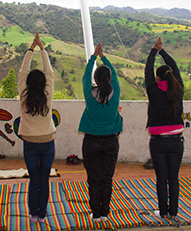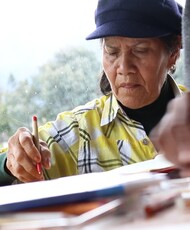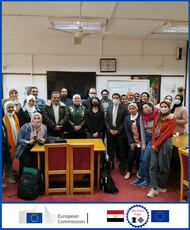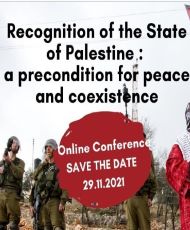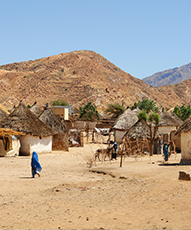![]()
FIELD OF INTERVENTION: Socio-economic Development, Capacity Building, Professional Training
GEOGRAPHICAL AREA: Latin America, Brazil, State of Bahia
SHORT DESCRIPTION OF THE PROJECT: The project is in line with the overall action, following a poverty reduction strategy, taken by the national and federal governments, as well as by the World Bank, which promoted intervention programs in rural areas of the State of Bahia, particularly in the semi-arid region. The action is intended to address those factors causing a condition of “poverty trap”, namely those factors preventing poor areas or communities from finding a mechanism of autonomous development and from being involved in a development process affecting other neighboring areas or communities. The aim of the project is to carry out training programs on cooperativism, designed to create employment and to support associationism in the production system, dedicated to Bahia’s craftsmen and based on a training proposal focusing on solidarity, participation and human and civil rights. The proposed action aims at the creation of 5 development hubs for mineral handicraft across the territory, diversified on the basis of specific characteristics of production, which are already existing or have to be developed based on market needs, and the creation of a Consortium for marketing of products.
OBJECTIVES: The general objective is to contribute to the fight against poverty, to social inclusion and to the reduction of child labor in the poorest semi-arid area of the State of Bahia, through the creation and strengthening of an economically sustainable handicraft production network for processing minerals in the State of Bahia, which is a major manufacturer in this sector. Specific objectives are: ● Find a way out of the “poverty trap” for about 3000-3500 families, through the development of production and entrepreneurial skills for about 2000 craftsmen working in the mineral processing sector and through the impact on satellite activities related to the extraction of minerals and marketing of products. ● Provide a permanent organization and coordination ability for mineral handicraft on a cooperative basis, to support training, technological development, market penetration and financial assistance in the production and marketing stages. ● Fighting child labor in the mineral handicraft and extraction sectors and promoting basic and professional training.
ACTIVITIES:
- Analysis of production units and evaluation of training needs.
- Purchase, activation and technical assistance for the cooperatives’ equipment.
- Technical and management training for production, marketing and cooperative organization of work.
- Legal and organizational support for creating Development Hubs linking production units among themselves and turning training centers into production centers.
- Marketing assistance and promotion of innovative outlets.
- Management and institutional know-how transfer.
- Creation of a mineral handicraft portal to provide services to enterprises.
- Organizing a distribution network on the territory to be implemented as a consortium.
- Participation in fairs and exhibitions.
- Supporting in the search for customers and for the conclusion of at least two large contracts.
- Participatory analysis, collection of best practices.
- Workshop on microcredit.
- Establishment of a revolving fund for granting credit for the development of craft businesses.
- Technical assistance for credit enquiries, provision and monitoring.
- Production and dissemination of information material.
- Awareness-raising and monitoring activities concerning child labor and right to education.
- Definition of measures to encourage the “child labor free product” brand and to discourage who is infringing the law.
- Training modules on the correct use of natural resources.
RESULTS:
- Production standards improved through training, new equipment, financial and consultancy services, with 100 craftsmen trained on cooperativism, quality of products, production management and safety, marketing.
- Pilot tests on production associationism on a district basis, with the development of “child labor free” branded products, implemented.
- Regional Consortium for mineral handicraft, including a portal capable to provide Brazilian craft businesses with various services, created.
- Stock of high quality products to be presented as samples to potential customers, produced in partnership.
- Sales department, operating at the regional level, for the marketing of products from craft cooperatives, established.
- A national and international client portfolio and at least one contract on the Brazilian market and one on the European market, obtained.
- Skills in products promotion and marketing, developed.
- Microcredit system to support craft businesses beneficiaries of the project, established.
- Good practices taking into account the fight against child labor, disseminated.
PARTNERSHIP: Lead applicant: Progetto Sud. Partners: MINARTE (Centro de Apoio Ao Artesanato Mineral da Bahia), SEDUR (Secretaria do Desenvolvimento Urbano), SICM (Secretaria de Indústria, Comércio e Mineração), CBPM (Companhia Baiana de Pesquisa Mineral), Mcidades (Ministério das Cidades), MDS (Ministério do Desenvolvimento Social), CEIS (Centre for Economic and International Studies) University of Rome Tor Vergata.
TIME PERIOD/DURATION: 3 years (concluded in 2007).
DONOR: Lombardy Region, CBPM (Companhia Baiana de Pesquisa Mineral)

